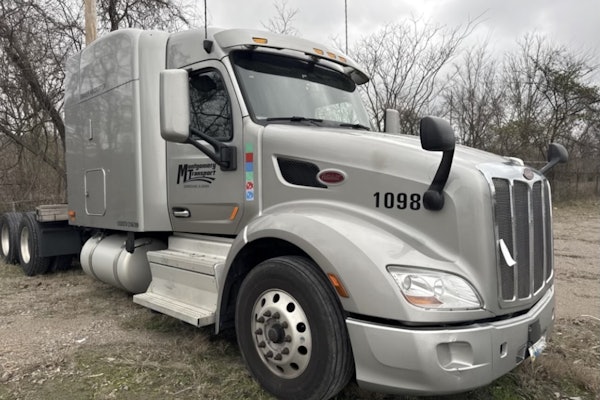Freight Transportation Services Index decreased 1.0 percent to 125.6 in August from the July level of 126.9, according to the U.S. Department of Transportation’s Bureau of Transportation Statistics. The decrease follows a one-month rise in July. The August 2004 level of 125.6 is 6.1 percent higher than the August 2003 level of 118.4. The baseline year for the experimental index, which was launched in March, is 1996.
Missouri Department of Transportation is considering a proposal to place five toll plazas on Interstate 70 between Kansas City and St. Louis to help fund a major overhaul of the highway. Information on the project, called Improve I-70, is available at this site.
CompuNet Credit Services, a supplier of business credit information to the transportation industry, has been acquired by First Advantage Corp. CompuNet developed and maintains a database of payment practice records on more than 60,000 transportation brokers and shippers in North America. Subscribing clients can evaluate the nonpayment risk of shippers and brokers before agreeing to transport cargo on credit.
XTRA Lease has been honored as the bronze medal winner in the Credit Risk Management category of the 2004 Alexander Hamilton Awards for their implementation of nFusion, eCredit’s integrated credit and collections automation suite. XTRA said that a key component in its success in providing optimal customer service is its ability to make high-quality credit decisions rapidly.
The American Jobs Creation Act of 2004, which became law (Public Law 108-357) on the eve of the 2004 elections, contains many tax law changes that should interest owners and executives of trucking companies. Two of the more significant provisions that relate directly to the trucking industry are elimination of installment payments for the heavy vehicle use tax and a restructuring of the tax on truck tires. (See “Law changes trucking taxes,” page 52.) But many of the law’s more general provisions also affect trucking executives.
On the whole, the tax act contains many tax breaks and extensions of expiring tax breaks, and that is good for business in general. But there also are “revenue enhancements” that raise funds to offset some of the breaks being given. So, some win, some lose.
In terms of “what’s good for business,” there has been an extension of the expanded “Section 179” deduction, or first-year write-off of equipment, for the $100,000 limit. This is extended for two more years and now will run through 2007. On the other hand, the so-called “Hummer Write-off” has been eliminated. Big SUVs have this Section 179 deduction limited to $25,000. If you have read my previous columns about buying stuff just to get the tax break, you know I’m not sorry this tax break is being cut back.
S corporations come out a winner. The law allows for more shareholders for S corporations so that husbands and wives can be treated as one shareholder in determining the maximum number of stockholders. Now S corporations can have 100 shareholders, instead of the old number of 75. And now “suspended losses” can be transferred along with the shares. This is very helpful in the unfortunate circumstance of divorcing couples that are dividing S corporation shares.
When you start a business, the “organization cost” – such as attorney fees, initial feasibility studies and the like – normally is capitalized and amortized over 60 months. A new provision allows a small amount of this – the first $5,000 – to be deducted currently.
On the personal side, there is a new itemized deduction available for state and local general sales tax. This will benefit people in states with low or no income taxes and allow an option to deduct what may be the higher sales taxes.
A big change in personal tax matters involves “non-cash contributions” to charities, such as cars or trucks, other vehicles, boats or airplanes. When someone gives this type of property to a charity in lieu of cash, new information for reporting and substantiation will be required to back up the market values being deducted. This is to eliminate perceived abuses of this deduction when people inflate the value of donated property – and basically limits the deduction to the amount of cash the charity received when they sold the property.
Bigger corporations with executive compensation plans and nonqualified deferred compensation plans will have new rules and regulations to observe. In a nutshell, these make it harder to deduct payments into these types of plans.
There are numerous “anti-tax shelter” provisions that close or tighten a number of loopholes. Many of these increase the penalties for failing to disclose “reportable transactions,” which generally are tax-shelter schemes that the IRS requires to be disclosed in the company’s or the individual’s tax returns.
There’s more for your CPA to digest. In addition to the above, the act makes changes concerning depreciation, treatment of natural resources, tax credits, casualty losses, investments, accounting methods, international taxation and excise taxes, to name just a few of the other affected areas. But all in all, don’t get too worked up about this new law. Trust your CPAs to be on top of the situation.
So much for the concept of tax simplification. Just a summary of this bill that I reviewed was almost 100 pages, and exceeded 36,000 words. If nothing else, reading the American Jobs Creation Act of 2004 ought to be a cure for insomnia.
Background on HR 4520, The American Jobs Creation Act from the House Committee on Ways & Means: http://waysandmeans.house.gov/Links.asp?section=1559








